全球南方海洋资源经济学——应对《2030年议程》的挑战
IF 1.7
3区 经济学
Q2 ECONOMICS
引用次数: 5
摘要
在“全球南方海洋资源经济学”特刊的引言中,我们讨论了发展中国家和转型期国家水产养殖和捕捞渔业可持续管理的当前挑战。我们注意到,集体行动问题仍然是全球南方捕捞渔业面临的重大挑战。半个世纪以来,水产养殖一直是一个快速发展的食品行业,为全球南方的弱势群体提供了低成本、高质量的蛋白质,但负外部性仍然是全行业的挑战。我们提供了与全球南方相关的水产养殖和渔业经济学的背景,以本期中的六篇文章为出发点,讨论了根据联合国可持续发展目标14(SDG 14)制定的10个目标中的六个:保护和可持续利用海洋和海洋资源。结合实现可持续发展目标14的挑战和本期特刊的贡献,我们为那些对与全球南方背景相关的渔业和水产养殖的经济学分析感兴趣的人讨论了未来研究的议程。本文章由计算机程序翻译,如有差异,请以英文原文为准。
Economics of Marine Resources in the Global South—Meeting the Challenge of Agenda 2030
In this introduction to the special issue, “Economics of Marine Resources in the Global South,” we address the current challenges for sustainable management of aquaculture and capture fisheries in developing and transitional countries. We note that the collective action problem remains a major challenge for capture fisheries in the Global South. While aquaculture has been a fast-moving food sector for half a century and provides disadvantaged people in the Global South with low-cost, high-quality protein, negative externalities remain an industry-wide challenge. We provide a background to aquaculture and fisheries economics relevant for the Global South, using the six articles contained in this issue as a point of departure to discuss six of the 10 targets that are formulated in connection with the United Nation’s Sustainable Development Goal 14 (SDG 14): conserve and sustainably use the oceans, seas, and marine resources. Bringing together the challenges of meeting SDG 14 and the contributions of this special issue, we discuss an agenda for future research for those interested in the economics analysis of fisheries and aquaculture relevant to the Global South context.
求助全文
通过发布文献求助,成功后即可免费获取论文全文。
去求助
来源期刊

Marine Resource Economics
农林科学-渔业
CiteScore
4.30
自引率
10.30%
发文量
25
审稿时长
>12 weeks
期刊介绍:
Marine Resource Economics (MRE) publishes creative and scholarly economic analyses of a range of issues related to natural resource use in the global marine environment. The scope of the journal includes conceptual and empirical investigations aimed at addressing real-world oceans and coastal policy problems. Examples include studies of fisheries, aquaculture, seafood marketing and trade, marine biodiversity, marine and coastal recreation, marine pollution, offshore oil and gas, seabed mining, renewable ocean energy sources, marine transportation, coastal land use and climate adaptation, and management of estuaries and watersheds.
 求助内容:
求助内容: 应助结果提醒方式:
应助结果提醒方式:


